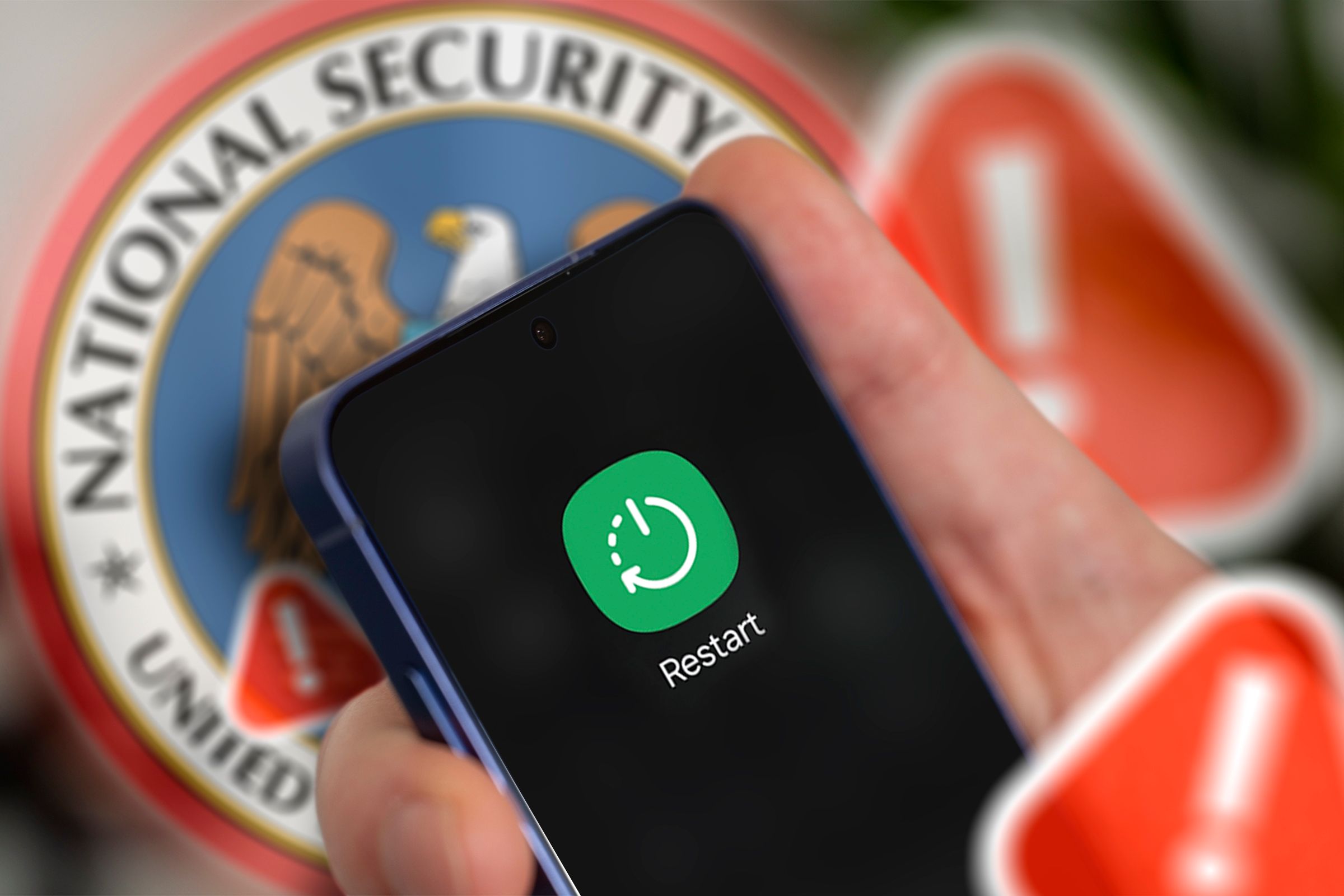
Why the NSA Advises Weekly Phone Reboots and What It Means for Your Privacy

Why the NSA Advises Weekly Phone Reboots and What It Means for Your Privacy
Key Takeaways
- The National Security Administration (NSA) is asking you to reboot your phone once a week to remove potential malicious code.
- Rebooting helps stop malicious code from executing and clears temporary files.
- You should also follow mobile security best practices to prevent cyberattacks and reduce potential damage.
Outside the occasional software update, you probably don’t reboot your phone very often unless you regularly run out of battery. Here’s why the National Security Agency (the NSA, which is responsible for protecting the US’ communications and cybersecurity) says you should make a habit out of it.
What Did The NSA Say, And Should You Be Worried?
In short, the NSA is asking you to reboot your mobile devices once a week. iPhone and Android phones (and iPads/tablets) should be regularly rebooted to wipe any malicious code that may have made its way onto the system.
This announcement shouldn’t be a cause for concern: no new specific threat has been identified, but fully rebooting your devices by turning them off and back on is part of good digital hygiene, and one of the 13 mobile device best practices being promoted by the NSA to help protect you from phishing, malicious apps, and other attacks.
Other mobile security best practices the NSA are suggesting you follow include:
- Keeping your apps and software up to date to protect against known exploits.
- Only installing apps from official App stores to protect against malicious apps.
- Avoiding connecting to public Wi-Fi networks (like in hotels) that could intercept your data.
- Not clicking links or opening attachments in emails to prevent viruses.
- Keeping your devices locked with biometrics, PINs and passwords to prevent a lost device being used to get access to your accounts.
How Restarting Your Android and iOS Devices Regularly Improves Security
Modern mobile operating systems include measures that protect the core system from being modified by malicious code. However, this doesn’t stop malicious code from actually being executed, either by user action (opening a virus-infected email attachment, for example), or without it (in the case of zero-click attacks ). Restarting your device means that any malicious code that is potentially running is stopped, and as it (hopefully) wasn’t able to modify the operating system on your device, it will not start again when the device boots.
Malware that records or interferes with your activity can also be stored in temporary files, which are usually cleared during a reboot. Your device’s performance may also be improved by regularly turning it off and on again, as buggy applications that may be using increasing amounts of memory will be forced to release those resources and restart.
Staying Secure In An Increasingly Threatening Mobile World
We all rely on our mobile devices in our day-to-day lives, so giving them up is out of the question. So how do you stop worrying and learn to love our connected present and future? The best you can do is follow best practices , and stay vigilant at home, at work, and even on holiday . Most attacks and scams happen because of user negligence, not due to sophisticated technical attacks like the ones in spy movies (unless you happen to be a spy).
If you do fall victim to a cybersecurity attack (and, realistically, most of us will at some stage, through our own fault or not), you can at least take comfort that you did your best to avoid it, and maybe even lessen the damage done.
Also read:
- [New] 20 Most Memorable Anime Series Intros for 2024
- [New] Conquer KineMaster, Rule the Meme World
- [New] The 50 Must-Try Virtual Bikes for Riders
- [New] The Insider's Handbook to Crafting Shareable Meme GIFs
- [New] Unite Video Files Into Playlist Assembly
- [New] Your Step-by-Step Approach to YouTube Copyright Mastery for 2024
- [Updated] 2024 Approved Is It Wise to Keep Off-Facebook Activity Displayed? Insights
- [Updated] In 2024, Pinnacle Edition - Tweets Transformed Into Timeless GIFs
- [Updated] The Finest Videography Tools
- [Updated] Unleashing the Full Potential of Your Phone Into VR Realm
- 4 Easy Ways for Your Tecno Spark 10 Pro Hard Reset | Dr.fone
- How to Unlock OnePlus Ace 2 Bootloader Easily
- In 2024, The Elite List 10 Websites with Superior Vectors
- The Ultimate Fix for Missing or Lost Wininet.dll Files on Your PC
- The Ultimate Guide to AE Title Effect Wizardry for 2024
- The Ultimate List of High-Quality Streaming Services for Cricket Fans for 2024
- Ultimate Guide to Professional-Grade Mobile Screencasting with Mobizen for 2024
- Title: Why the NSA Advises Weekly Phone Reboots and What It Means for Your Privacy
- Author: Mark
- Created at : 2024-12-19 02:30:23
- Updated at : 2024-12-25 02:24:40
- Link: https://some-guidance.techidaily.com/why-the-nsa-advises-weekly-phone-reboots-and-what-it-means-for-your-privacy/
- License: This work is licensed under CC BY-NC-SA 4.0.